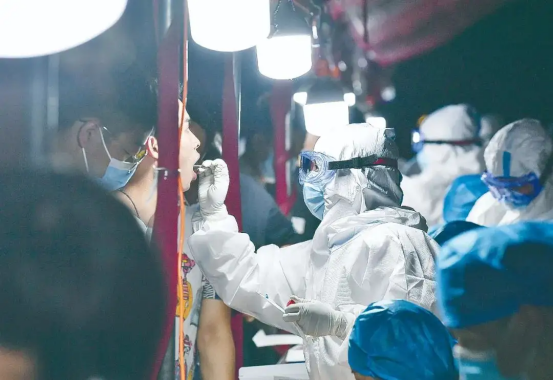
By Li Panpan
Unpredictable risks so far this year in 2022, like the Russia-Ukraine war and stringent citywide lockdown to halt the Omicron pandemic in Shanghai and other cities, have brought tremendous pressure to the Chinese automobile market and its supply chains. Government departments at different levels and carmakers are working together to come up with solutions.

Data released by the China Automobile Association (CAA) shows lower than expected automobile production and sales in March and the first quarter, as well as declining consumption momentum in the country. International carmakers operating in China have also been affected.
Faced with chip shortages, JAC, a major vehicle manufacturer in eastern China’s Anhui Province, expects to lose about RMB307 million ($48.17 million) in the first quarter of this year. Volvo said its car sales fell 22% to 58,677 in March.
There are also reports that some 1,000 automobile-related companies in Shanghai are suffering from revenue loss and other challenges.
He Xiaopeng, chairman of the new EV star Xpeng Motors, warned last week that all OEMs in China might have to stop production if Shanghai and surrounding supply chain companies cannot find a way to resume work and production in May.
On April 18, China’s Ministry of Industry and Information Technology (MIIT) took action by issuing guidelines to ensure the logistics flow and stability of industrial and supply chains.
Following the instructions of the Shanghai authorities, 666 companies on the whitelist resumed work and production on April 18. Among them are more than 250 car-related companies, such as Tesla, SAIC Volkswagen, and SAIC-GM.
However, obstacles are huge for enterprises to resume work and production. One significant risk is having a large number of employees return to factory sites. A medical equipment company executive told JW Insights that his company is communicating with local authorities on how to reopen the operation and has not received approval yet.
Globally, Auto Forecast Solutions (AFS) points out that global car sales estimates have shrunk by around 1.4 million year-to-date due to chip shortages. The consequence of this global automobile downturn has not been severely affected.
China market. But one industry observer pointed out that a sudden local disruption like Shanghai’s extended lockdown could deal a heavier blow to the local industry if not handled well. Facing the dilemma, car companies need to find new solutions to secure profits when sales and manufacturing are unstable.
RELATED
-
Apple’s Chinese supplier Luxshare Precision gives up $330 million investment in India
11-20 17:28 -
European Commission President von der Leyen will visit China in wake of the EU’s ongoing probe into China’s subsidies on EV industries
11-20 16:59 -
China’s tech giant Alibaba terminates the plan to spin off of its cloud business in wake of tightened US chip export controls
11-17 15:36









